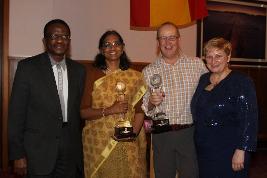
There is very little argument that internationalisation is a desired strategy of any university in the 21st Century; the debate is more around what constitutes an appropriate internationalisation strategy within each context at the national, regional and institutional levels. This is according to Director of Internationalisation at Rhodes University, Ms Orla Quinlan, who addressed Rhodes University staff and students on the importance of internationalisation at the inaugural internationalisation awards recently held in the Senior Common Room bedecked with International flags and attended by the University’s most senior staff.
Rhodes Vice-Chancellor Dr Sizwe Mabizela addressed the gathering, before presenting beautifully crafted glass trophies, reminding us that although human beings have made great advances in science, technology and space exploration, we have a long way to go in learning how to be truly human with each other. Internationalisation is certainly part of the solution but in itself is not sufficient and needs to be accompanied by changes in our attitudes and behaviour closer to home.
Professors Roddy Fox of the Geography Department and Sunitha Srinivas of the Faculty of Pharmacy are the recipients of the 2014 awards, the first recognition of this dimension of excellence at Rhodes University aimed at recognising commitment and innovation in Internationalisation in the academic endeavour at Rhodes.
According to Ms Quinlan, as the most visible site of knowledge creation, the university has a social responsibility to equip the members of the society with necessary competencies, knowledge, understandings, and new skills so that they can constantly negotiate the changing nature of work, information technologies and cultural identities of people. “The 21st century university faces numerous challenges at the local, regional and global levels. Problems and issues in the current socio-economic and geo-political environment demand broader, multi-perspective understanding about the world, life and work,” she said. According to Ms Quinlan, only two percent of the world’s student population ever go on exchange programmes. There is growing attention to the need for internationalisation at home and the Internationalisation of the curriculum to ensure that the 98% of students who don’t have exchange programme opportunities are being prepared for an inter-connected world. Significant recent developments in Higher Education between 2010 – 2014 including the 2014 Nelson Mandela Global Dialogue Declaration on the Future of Internationalisation of Higher Education calling for Ethical and Inclusive considerations in International Education; the European Association for International Education (EAIE) calling for universities to adopt the International Student Mobility Charter and the International Association of Universities (IAU) calling for the Affirmation of Academic values in Internationalisation of Higher Education.
Recipient Professor Fox who heads the Geography department, one of the most internationalised departments on campus, presented a brief overview on his pioneering approach to internationalisation at Rhodes. Dealing with broad issues of space, development and landscape Professor Fox believes the discipline lends itself to being in touch with the world. Statistics show that in any given year in the Geography department 75% of students studying for PhDs, 50% for Masters and 40% for Honours students are involved in some kind of overseas academic activity, including presenting papers and undertaking courses at international institutions. During his tenure Professor Fox, who is a former Rhodes University Distinguished Teaching Award recipient (2004), has seen the implementation of the Linnaeus-Palme programme from 2002-2010 with a group of Swedish universities, which saw 16 faculty and 48 student exchanges. In recent years he has done research on how to develop higher education within Economic Geography, leading to the development of a model in which a combination of traditional teaching, web based learning and role play is used. An example of such role play is The African Development Game, developed to show the difficulties of six African nations in reaching the millennium development goals for food provision, health care, education and an environmentally sustainable development.
Recipient Professor Sunitha Srinivas also presented. Professor Srinivas has broad experience working in the public health sector and specifically in the area of access to essential medicines, having worked with the the Karnataka State Pharmacy Council (KSPC) in 1998, as the Deputy Director, Medicines Information Centre and the India - World Health Organisation Essential Medicines Program in Karnataka province from 1999-2002. A conscious return to academia in 2003 was fuelled by her desire to “‘raise an army’ of competent, committed and conscientious future pharmacists who could cumulatively, in various parts of Africa and the world, address these health issues and work towards positive changes for the marginalised majority of the populations in developing countries” . She has been incorporating more and more aspects of internationalisation into the curriculum over the last decade. Examples include the frequent use of country case studies which Professor Srinivas believes are of personal relevance to students “because I choose published, research based articles for discussion from various countries to provide insight on the reasons why essential medicines remain unavailable, inaccessible and unaffordable to more than two billion people, mainly in developing countries”. A former recipient of the Vice Chancellor’s Award for Community Engagement at Rhodes (2008), Professor Srinivas has also served on the university’s Internationalisation Committee and coordinated the activities of the Global Pact, the Global Partnership for Activism and Cross-cultural Training.
Presentations were interspersed with some live musical entertainment from the very talented Paul Daniles ll, Kay Mosiane, Armand Steenkemp and Gareth Walwyn.
Article by: Sarah-Jane Bradfield
